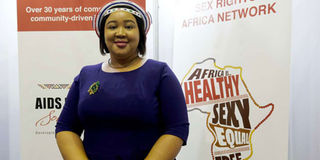Queen wants child marriage abolished

Child marriage is rape and worst form of abuse on African girls, Her Majesty Queen Sekhothali Mabhena of the South African Kingdom of Ndebele said on Monday in Nairobi.
Queen Mabhena who is attending the 9th Africa Conference on Sexual Health and Rights (ACSHR) said the primitive practice must be abolished to safeguard the future of girls in the African continent.
“Child marriage is rape; it is abuse at the highest level. There is no covering it with culture and traditions. There is no African culture that condones such (rape),” she said during an interview at Kenyatta International Convention Centre (KICC) where the five-day conference is being held.
She was emphatic on educating girls instead of giving them away as property.
“We need to ensure our girls go through the education system as far as they can, as opposed to giving them away for two chickens and a goat,” she noted.
Parents, she said, should also be educated on nurturing their girls and creating safe spaces for them to grow into healthy beings.
EVOLVING WORLD
“The world is evolving now and there are certain things that were held by culture and traditions which were stigma but honestly it is time to change,” she said.
In Africa, at least 70 per cent of girls are married while below 18 years, according to United Nations Children's Fund is a United Nations (UNICEF).
Teen marriages complicates future of the girls because their studies are discontinued, limiting their chances of becoming socially and economically empowered.
The queen said inclusion of men in gender equality advocacy would bring forth long-term and sustainable solutions to women and girls’ problems.
“It is important men get involved in everything we do. We should not leave them out of the things we want to achieve. It is time for men to stand with women and make sure they support us enough to get what we deserve,” she said.
The conference running from February 10 to 14, has been convened by African Gender and Media Initiative Trust.
It brings together gender equality advocates, civil society and scholars from six African countries to reflect on government’s efforts towards addressing sexual and reproductive health and rights of women and girls in the slums as well as propose solutions to be presented to the respected governments.





